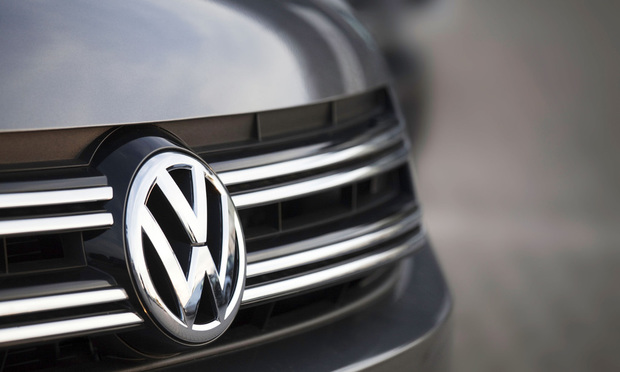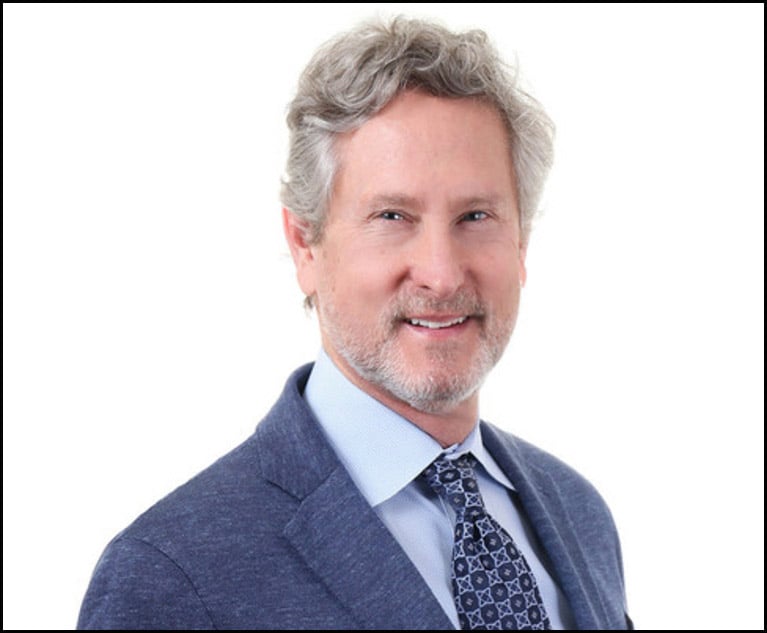Daily Dicta: Late to the Party, the SEC Unleashes a Dubious Suit Against VW
VW was quick to denounce the SEC's action as “piling on”—and the company does have a point.
March 18, 2019 at 12:19 PM
6 minute read
 In 2016, it seemed like Volkswagen had neatly managed to put the diesel emissions scandal behind it.
In 2016, it seemed like Volkswagen had neatly managed to put the diesel emissions scandal behind it.
Sure, there still were some ongoing state-level actions, but all the big stuff was supposedly over, wrapped up in a $14.7 billion deal that covered a class action by VW owners plus claims by the Department of Justice, the EPA, the Federal Trade Commission, the California Air Resources Board and attorneys general of 44 states, the District of Columbia and Puerto Rico.
It was an impressively broad group of plaintiffs—with a notable omission: The U.S. Securities & Exchange Commission
Now, like some regulatory version of the fairy tale witch Maleficent—who cursed Sleeping Beauty because she wasn't invited to her party—the SEC last week unleased a massive suit on VW in San Francisco federal court.
The agency says that VW (which is primarily listed on the Frankfurt Stock Exchange) sold “billions of dollars of corporate bonds and other securities in the United States… without disclosing that its 'clean diesel' cars used defeat devices to conceal substantial emissions problems.”
The result? Giant institutional investors allegedly didn't make as much money as they should have on the bonds.
 VW in a statement was quick to denounce the SEC's action as “piling on”—and the company does have a point.
VW in a statement was quick to denounce the SEC's action as “piling on”—and the company does have a point.
As Deputy Attorney General Rod Rosenstein noted in a speech last May, ”'Piling on' can deprive a company of the benefits of certainty and finality ordinarily available through a full and final settlement. We need to consider the impact on innocent employees, customers, and investors who seek to resolve problems and move on. We need to think about whether devoting resources to additional enforcement against an old scheme is more valuable than fighting a new one.”
The SEC is a 4,200-person agency with an enormous mission—to oversee $82 trillion in securities trading annually on U.S. equity markets and $40 trillion in the U.S. fixed income market.
Every enforcement action it takes needs to be considered against an overarching question: Is this the best use of the agency's limited resources?
In the case of VW, there's a solid argument that the answer is no.
SEC Chairman Jay Clayton in December told Congress that the agency's first priority is “focusing on the interests of our long-term Main Street investors… Each proposal or action we take is guided by that principle.”
But the investors at issue in the VW case are about as far from Main Street as you can get. The bonds were private placements, open only to investors with a minimum of $100 million.
Before we call Clayton a hypocrite, remember that until 2017, he was a partner at Sullivan & Cromwell—the firm that represents VW. And Steven Peikin, who is co-director of the SEC's Enforcement Division, headed Sullivan & Cromwell's criminal defense and investigations group before he too joined the SEC in 2017.
Both are likely recused from the VW case. (The SEC's public affairs office did not respond to a request for confirmation.)
The result? Rather than benefiting from friends in high places, VW may have found itself in the SEC's crosshairs without the moderating influence of more sympathetic, politically-appointed officials with different priorities.
It's not that institutional investors don't deserve protection too. But here, no one actually lost money. VW says the investors “were not harmed and received all payments of interest and principal in full and on time.”
The SEC, however, says that VW still defrauded the investors out of hundreds of millions of dollars of additional profit because they should have been paid a higher interest rate on their money.
“U.S. investors purchased billions of dollars of VW debt, with low interest rates, based on their understanding that they were buying a safe investment in a world-class company,” the SEC complaint states. “Instead, when VW's decade-long scheme finally came to light, investors were left holding bonds that were far riskier than they were told, thought, or were compensated for.”
The SEC hangs its contentions on a 2014 study that marked the beginning of VW's fraud coming to light.
West Virginia researchers working on behalf of the International Council on Clean Transportation tested three vehicles, and two of them discharged pollutants at levels far above the legal limit. When the researchers presented their findings at a conference, they didn't reveal the make and model of the vehicles, but the SEC said “VW employees in attendance knew immediately the two cars that dramatically failed the emissions tests were Volkswagens.”
At that point, the SEC said, people within VW knew they faced legal exposure but hid it from U.S. investors so the company could get away with paying lower interest rates on its securities.
Still, it's not clear whether the VW finance people who oversaw the bond offerings had any inkling of the defeat devices. It's also not clear that even if they did, they would have viewed it as a significant risk.
As John Coffee Jr., a Columbia Law School professor and director of the Center on Corporate Governance, noted in a 2016 blog post, VW wasn't the first automaker caught installing a defeat device.
Seven diesel truck manufacturers admitted they installed the devices in 1.3 million diesel vehicles. In 1998, they entered into a consent decree with the Department of Justice and paid $83.4 million fine—$64.15 per truck. And Ford in 1996 resolved claims that it installed similar defeat devices in more than 60,000 Econoline vans, paying a $2.5 million civil penalty—$41.66 per van. VW itself got busted for defeat devices in 1973 and paid a civil penalty of $120,000.
“Folks, these are bargain prices!” Coffee wrote. “That certainly taught Volkswagen a lesson. Unfortunately, the lesson learned was that crime did pay.”
Not anymore. The company says it has now shelled out $23 billion in connection with the defeat devices.
While VW in 2016 was eager to reach a broad settlement on multiple fronts as quickly as possible, that's not its posture in the SEC suit.
Indeed, VW's lead counsel, New York-based Sullivan & Cromwell litigator Robert Giuffra Jr., jokes he might as well get an apartment in San Francisco, he'll be spending so much time battling the SEC in the Northern District of California.
“Our strategy has been to settle the VW cases that could be settled on reasonable terms as quickly as possible and to litigate where VW had no other choice,” Giuffra said. “We're confident that we can achieve a good result for VW by litigating with the SEC, and we may have to try the SEC's case before Judge [Charles] Breyer.”
This content has been archived. It is available through our partners, LexisNexis® and Bloomberg Law.
To view this content, please continue to their sites.
Not a Lexis Subscriber?
Subscribe Now
Not a Bloomberg Law Subscriber?
Subscribe Now
NOT FOR REPRINT
© 2025 ALM Global, LLC, All Rights Reserved. Request academic re-use from www.copyright.com. All other uses, submit a request to [email protected]. For more information visit Asset & Logo Licensing.
You Might Like
View All
Shareholder Democracy? The Chatter Elon Musk’s Tesla Pay Case Is Spurring Between Lawyers and Clients
6 minute read
Litigation Leaders: Mark Jones of Nelson Mullins on Helping Clients Assemble ‘Dream Teams’

Litigators of the Week: Rolling Back Elon Musk's $56B Tesla Compensation Package

Litigators of the Week: Quinn Emanuel Slashes $137M Racial Discrimination Verdict Against Tesla by Nearly 98%
Trending Stories
- 1'Ridiculously Busy': Several Law Firms Position Themselves as Go-To Experts on Trump’s Executive Orders
- 2States Reach New $7.4B Opioid Deal With Purdue After SCOTUS Ruling
- 3$975,000 Settlement Reached After Fall on Sidewalk
- 4'Where Were the Lawyers?' Judge Blocks Trump's Birthright Citizenship Order
- 5Big Law Sidelined as Asian IPOs in New York Are Dominated by Small Cap Listings
Who Got The Work
J. Brugh Lower of Gibbons has entered an appearance for industrial equipment supplier Devco Corporation in a pending trademark infringement lawsuit. The suit, accusing the defendant of selling knock-off Graco products, was filed Dec. 18 in New Jersey District Court by Rivkin Radler on behalf of Graco Inc. and Graco Minnesota. The case, assigned to U.S. District Judge Zahid N. Quraishi, is 3:24-cv-11294, Graco Inc. et al v. Devco Corporation.
Who Got The Work
Rebecca Maller-Stein and Kent A. Yalowitz of Arnold & Porter Kaye Scholer have entered their appearances for Hanaco Venture Capital and its executives, Lior Prosor and David Frankel, in a pending securities lawsuit. The action, filed on Dec. 24 in New York Southern District Court by Zell, Aron & Co. on behalf of Goldeneye Advisors, accuses the defendants of negligently and fraudulently managing the plaintiff's $1 million investment. The case, assigned to U.S. District Judge Vernon S. Broderick, is 1:24-cv-09918, Goldeneye Advisors, LLC v. Hanaco Venture Capital, Ltd. et al.
Who Got The Work
Attorneys from A&O Shearman has stepped in as defense counsel for Toronto-Dominion Bank and other defendants in a pending securities class action. The suit, filed Dec. 11 in New York Southern District Court by Bleichmar Fonti & Auld, accuses the defendants of concealing the bank's 'pervasive' deficiencies in regards to its compliance with the Bank Secrecy Act and the quality of its anti-money laundering controls. The case, assigned to U.S. District Judge Arun Subramanian, is 1:24-cv-09445, Gonzalez v. The Toronto-Dominion Bank et al.
Who Got The Work
Crown Castle International, a Pennsylvania company providing shared communications infrastructure, has turned to Luke D. Wolf of Gordon Rees Scully Mansukhani to fend off a pending breach-of-contract lawsuit. The court action, filed Nov. 25 in Michigan Eastern District Court by Hooper Hathaway PC on behalf of The Town Residences LLC, accuses Crown Castle of failing to transfer approximately $30,000 in utility payments from T-Mobile in breach of a roof-top lease and assignment agreement. The case, assigned to U.S. District Judge Susan K. Declercq, is 2:24-cv-13131, The Town Residences LLC v. T-Mobile US, Inc. et al.
Who Got The Work
Wilfred P. Coronato and Daniel M. Schwartz of McCarter & English have stepped in as defense counsel to Electrolux Home Products Inc. in a pending product liability lawsuit. The court action, filed Nov. 26 in New York Eastern District Court by Poulos Lopiccolo PC and Nagel Rice LLP on behalf of David Stern, alleges that the defendant's refrigerators’ drawers and shelving repeatedly break and fall apart within months after purchase. The case, assigned to U.S. District Judge Joan M. Azrack, is 2:24-cv-08204, Stern v. Electrolux Home Products, Inc.
Featured Firms
Law Offices of Gary Martin Hays & Associates, P.C.
(470) 294-1674
Law Offices of Mark E. Salomone
(857) 444-6468
Smith & Hassler
(713) 739-1250






